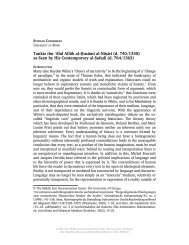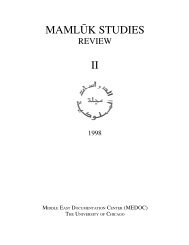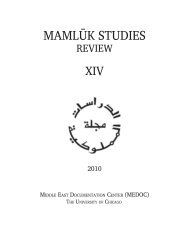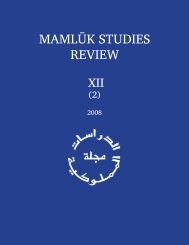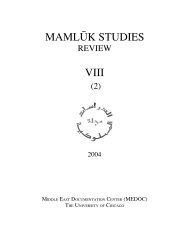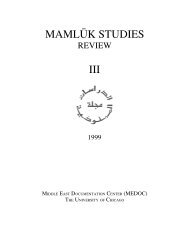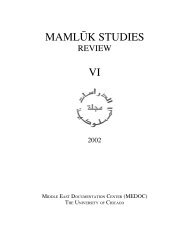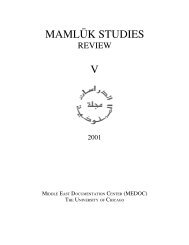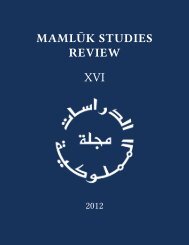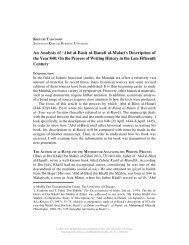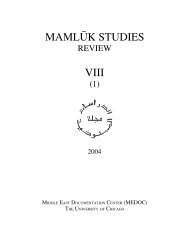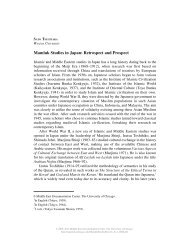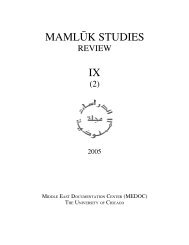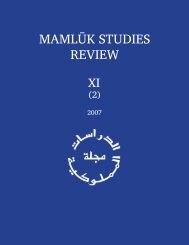Mamluk Studies Review Vol. IV (2000)
Mamluk Studies Review Vol. IV (2000)
Mamluk Studies Review Vol. IV (2000)
Create successful ePaper yourself
Turn your PDF publications into a flip-book with our unique Google optimized e-Paper software.
42 ROBERT IRWIN, UNDER WESTERN EYES<br />
still remain one of the strange and undecipherable phenomena in that land of<br />
many mysteries." 46 In the 1980s several scholars tried their hand at cracking the<br />
mystery. In Slaves on Horses: The Evolution of the Islamic Polity, 47 Patricia<br />
Crone, having argued that the mamluks were a distinctively Islamic phenomenon,<br />
went on to ask why this was the case. Her (somewhat moralistic) conclusion was<br />
that the mamluks were the product of the failure of the Islamic ummah to arrange<br />
its affairs according to the ideal program of the shari‘ah. The mamluks were a<br />
kind of punishment for political sin. In the Muqaddimah, Ibn Khaldu≠n had argued<br />
that Muslims had failed to follow the shari‘ah perfectly and their political regimes<br />
thereby become prey to cyclical decline and fall. The influence of Ibn Khaldu≠n<br />
pervades Slaves on Horses. Crone was trying to explain the general phenomenon<br />
of the slave soldiers throughout Islamic history. However, she did note the special<br />
features of the <strong>Mamluk</strong> regime in Egypt and Syria. She took the (surely exaggerated)<br />
view that the Egyptian <strong>Mamluk</strong> system only worked when there was an external<br />
threat; otherwise it degenerated into a civil war. The <strong>Mamluk</strong>s were predatory<br />
shepherds. (The shepherd image comes, I think, from Ottoman political theory.)<br />
Finally Crone stressed the comfortable symbiosis between <strong>Mamluk</strong>s and ulama<br />
and how the <strong>Mamluk</strong>s were seen by their subjects as the providential protagonists<br />
of the jihad—again very Khaldunian.<br />
Daniel Pipes' Slave Soldiers and Islam: The Genesis of a Military System 48<br />
appeared just a year later. Pipes' view of the problem was similar, though different.<br />
<strong>Mamluk</strong>s and other marginal troops rushed in to fill a politico-military vacuum,<br />
that vacuum having been created by the withdrawal from public affairs of other<br />
Muslims. The withdrawal from public affairs of these fainéant Muslims was the<br />
product of their disillusion at their failure to implement the Islamicate ideal. As<br />
the use of "Islamicate" indicates, Pipes was somewhat influenced by Marshall<br />
Hodgson. Ibn Khaldu≠n's influence is equally evident, but, whereas Ibn Khaldu≠n<br />
had argued that renewed imports of mamluks served to infuse the ruling regime<br />
with fresh nomadic vigor, Pipes argued that it was because of the unreliability of<br />
such troops that they kept having to be replaced. The notion of <strong>Mamluk</strong>s as a<br />
punishment for perceived failure to live up to Islamic ideals is a curious one.<br />
Papal and Imperial theorists in Christendom also had unreal and idealistic notions<br />
of government—and most Christians probably did not care about those ideals nor<br />
did they wish to be involved in politics. But only the medieval German ministeriales<br />
look anything like mamluks.<br />
46 Muir, The Mameluke or Slave Dynasty, 221.<br />
47 Cambridge, 1980.<br />
48 New Haven, 1981.<br />
© <strong>2000</strong>, 2012 Middle East Documentation Center, The University of Chicago.<br />
http://mamluk.uchicago.edu/<strong>Mamluk</strong><strong>Studies</strong><strong>Review</strong>_<strong>IV</strong>_<strong>2000</strong>.pdf



